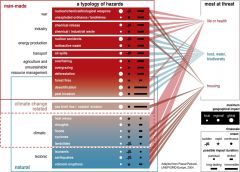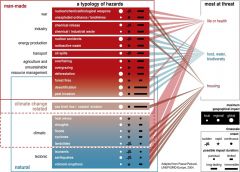![]()
![]()
![]()
Use LEFT and RIGHT arrow keys to navigate between flashcards;
Use UP and DOWN arrow keys to flip the card;
H to show hint;
A reads text to speech;
11 Cards in this Set
- Front
- Back
|
What are Geohazards? |
Include: Earthquakes, Volcanic Activity, Landslides, Tsunamis, floods etc |
|
|
What is a 'Natural Hazard'? |
Hazard which refers to all atmospheric, hydrologic, geologic and wildfire phenomena
Their location, severity and frequency have potential to affect humans Pollution, war and chemical contamination are not classed as natural |
|

|

|
|
|
Which 2 main ways can natural hazards be categorised ? |
CAUSE - Geophysical (quakes, volcanoes), climatic (floods, droughts, hurricanes) RAPIDITY - Sudden (quakes, hurricanes, floods) or slow (types of eruption, erosion, deforestation) Sudden and slow is a continuum |
|
|
Duration of impact(1) and warning(2) for: Avalanche, Earthquake, Tsunami, Fire, Desertification |
Avalanche: (1)Sec-min (2) sec-hour Earthquake: (1) sec-min (2) min-yr Tsunami: (1) min-hour (2) min-hour Fire: (1) hour-days (2) sec-days Desertification: (1) yr-decades (2) month-yr |
|
|
DEFINE: Hazard |
Apotentially damaging physical event, or human activity that maycause the loss of life or injury, property damage, social and economicdisruption or environmental degradation |
|
|
DEFINE: Vulnerability |
Numerous ways: 1: Theconditions determined by physical, social, economic and environmental factorsor processes, which increase the susceptibility of a community to the impact ofhazards. 2:Ahumancondition or process resulting from physical, social, economic and environmental factors, whichdetermine the likelihood and scale of damage from the impact of a given hazard |
|
|
DEFINE: Resilience |
Not easily defined: The capacity of a system, communityor society to resist or to change in order that it may obtain an acceptablelevel in functioning and structure. |
|
|
System or community resilience can beunderstood as (3): |
1. Capacityto absorb stress or destructive forces through resistance or adaptation 2. Capacityto manage, or maintain certain basic functions and structures during disastrousevents 3. Capacityto recover or ‘bounce back’ after an event |
|
|
Difference between hazard and vulnerability |
Hazard = natural processes capableof causingdeath and/ordestruction Vulnerability = social or economicsensitivity tothe effectsof hazards |
|
|
a |
a |

